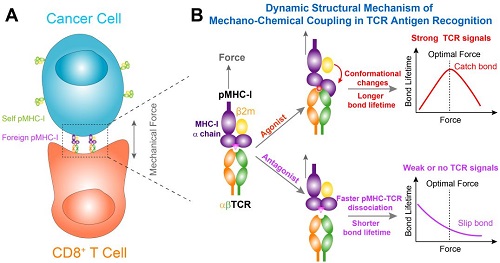Force-induced MHC conformational change is critical to TCR antigen discrimination
A research article entitled "Mechano-regulation of peptide-MHC class I conformations determines TCR antigen recognition "was published online by Molecular Cell on January 30th, 2019. In this paper, Jizhong Lou's group of Institute of Biophysics, Chinese Academy of Sciences and Wei Chen’s group of Zhenjiang University, reported a novel dynamic structural mechanism of the antigen discrimination of T-cell receptors (TCR).
The antigen recognition by TCRs is central to adaptive immunity and potential “neoantigen” related T-cell immunotherapy. How TCRs recognize “foreign” antigens, especially at the atomic level, still remain ambiguous. Previously, it has been demonstrated that TCR functions as a force sensor, that is, mechanical force-strengthened TCR-pMHC binding (“catch bonds”) is essential to TCR antigen recognition. However, traditional structural models failed to explain such dynamic mechano-chemical coupling process, preventing a comprehensive understanding on the intrinsic mechanism of TCR antigen recognition.
In this work, the authors discovered mechano-chemical coupling for TCRs to successfully recognize “foreign” antigens. That is, guided by agonist peptide, mechanical force unexpectedly induces pMHC conformational changes in a step-wise manner to allosterically activate new interactions that were not found in crystal structures to elicit TCR-pMHC catch bonds in both mouse and human TCR systems. More importantly, cancer associated mutations in HLA class I that restricted such conformational change significantly suppress TCR-pMHC catch bonds, implying that HLA’s somatic mutations or even HLA genotypes (polymorphisms) along with TCR/pMHC catch bonds would be critical factors to be considered for effective T-cell based immunotherapy in future.
Thus, this work not only reveals a universal dynamic structural mechanism of mechano-chemical coupling for antigen recognitions by TCRs, but also has important clinical implications in T-cell based immunotherapies.
This work was supported by grants from Ministry of Science and Technology, National Natural Science Foundation of China, Chinese Academy of Sciences and Zhejiang University.

Figure: Mechanical forces induced MHC conformational change to discriminate foreign and self antigens
(Imaged by Dr: Lou Jizhong’s group)
Article link: https://www.cell.com/molecular-cell/fulltext/S1097-2765(18)31072-4
Contact: Jizhong Lou, Ph.D.
Principal Investigator
Institute of biophysics, Chinese Academy of Sciences
Beijing100101, China
Tel: (86)-10-64888183
Email: jlou@ibp.ac.cn
(Reported by Dr. Lou Jizhong’s group)

